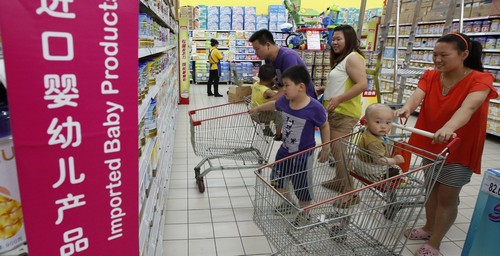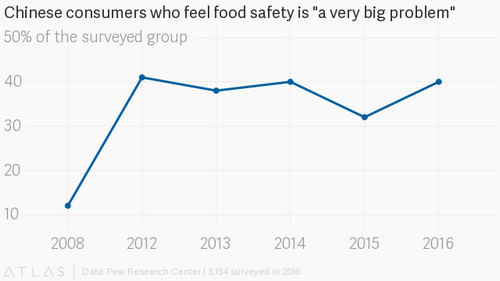It’s been almost a decade since China’s infamous milk powder scandal came to light-when tainted formula killed six infants. The trauma left by that episode has been so strong that people in China still strongly prefer a foreign brand to a domestic one when it comes to infant formula.

In a 2017 China consumer report released today (Nov. 22), consulting firm McKinsey Co. found that 53% of its survey group, which consisted of around 10,000 people from 44 Chinese cities, preferred or somewhat preferred a foreign brand for baby formula. That was the highest share for any consumer good category included in the report. The demand for infant formula is expected to grow with the easing of the one-child policy.
McKinsey looked at 17 consumer categories in total, which account for more than half of total retail sales in China. For nine of the categories, China showed a clear preference towards local brands, including fresh food and poultry, laundry detergent, and beer. After infant formula, wine was the only other category where more than half of respondents expressed a preference for foreign brands.
Daniel Zipser, head of McKinsey’s consumer packaged goods and retail practice for the Greater China region, told Quartz that the 2008 milk scandal was still “pretty top of mind for most people.”
The tainted milk sales also saw the country’s overall confidence in domestically produced food plunge-and worries about food safety remain high, according to survey data from Washington DC-based think tank Pew Research Center. China beefed up its safety rules in the wake of that food safety tragedy, passing a new law on food additives in 2009. In 2013 it set up the China Food and Drug Administration (CFDA) to monitor products. But new safety scares make it difficult to rebuild trust.

In April last year, Shanghai authorities arrested nine people involved in producing more than 17,000 tins of fake milk powder with counterfeit labels-so these products looked like those from American infant formula brand Similac, and Beingmate, one of China’s largest baby formula producers. Last year, Danone said it would no longer sell its Karicare formula in China after sales of the product were hit from a recall related to a botulism scare in 2013 that later turned out to be a false alarm.
At a press conference in February, the CFDA’s head, Bi Jingquan said that better regulation of milk powder is one of the most important concerns (link in Chinese) for the agency. The CFDA has brought in a new regulation that requires manufacturers to register their formulas and also limits the number of products a company can have.
The rules, which go into effect from January, are expected to sharply cut the number of formulas available and, worryingly for parents, could particularly weed out smaller foreign brands that may not find it worthwhile to go through the process of registering.
Some 93 manufacturers (link in Chinese), including 70 domestic ones, had registered their nearly 600 baby formulas as of Nov. 14. The information, which is available on the CFDA’s website (link in Chinese), will be better shared among inspection bodies in the near future, according to a senior official (link in Chinese) at the agency’s special food registration department, which oversees baby formula quality in China.


